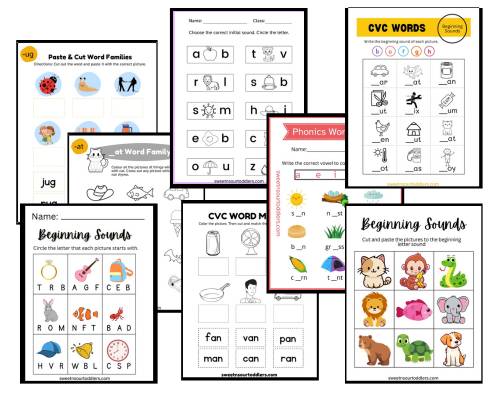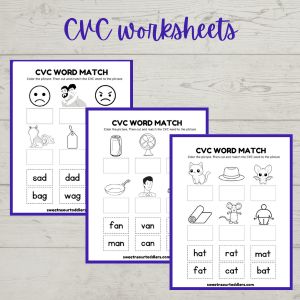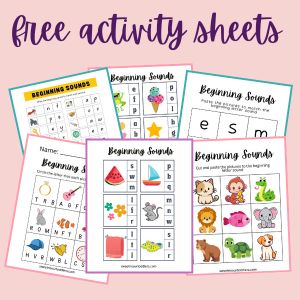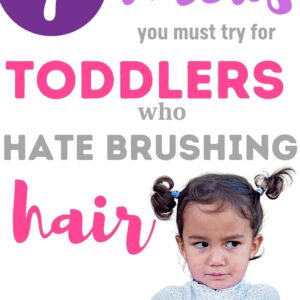Learn how to teach phonemic awareness to kindergarten kids in a way that is effective and fun!
When my child was 2.5 years old, teaching her reading wasn’t a priority on my list. In fact, it seemed absurd to even think about it.
But I soon learnt that teaching reading can start at a very young age. And it didn’t mean singing the alphabet song with her or sitting and doing activity sheets.
Rather, teaching a young child to read starts by laying a strong reading foundation. You can call this the pre-reading skills that a child learns BEFORE they start actually learning to read.
And on your part, that involves simple things like reading to your child every day, instilling a love of reading by setting up a reading corner in the house along with incorporating phonics and phonemic awareness in your everyday life.
My daughter was reading fluently by the age of 3 and phonics and phonemic awareness played a huge role in our journey.
Teaching phonemic awareness to kids lays the foundation for their future reading and writing skills. It’s an essential precursor to phonics and literacy development.
In this guide, I’ll go over what phonics and phonemic awareness are, why they’re important, and provide 10 tips and ideas to teach phonemic awareness in a way that is fun!
I also have some amazing reading activities and worksheets that will get your kids hooked on to reading. You can download these for FREE at the end of this post.
What is Phonics?
Phonics is the relationship between sounds and letters. It involves understanding that letters represent sounds, and those sounds blend together to form words. Phonics instruction typically focuses on letter-sound correspondence and decoding words.
What is Phonemic Awareness?
This post contains affiliate links. As an Amazon Associate I earn from qualifying purchases
Phonemic awareness is the ability to hear, identify, and manipulate individual sounds (or phonemes) in spoken words. Unlike phonics, which deals with the association between sounds and letters, phonemic awareness is purely auditory and doesn’t involve written language.
Importance of Phonemic Awareness
Phonemic awareness is a critical skill for early literacy development. Research shows that children with strong phonemic awareness skills are more likely to become successful readers and writers.
It helps children understand the structure of language, improves their ability to decode words, and enhances their spelling and writing skills.
Research shows that difficulty with phoneme awareness and other phonological skills is a predictor of poor reading and spelling development.
readingrockets.org
10 Tips to Teach Phonemic Awareness to Kindergarten Kids
This page contains affiliate links. If you choose to purchase after clicking a link, I may receive a commission at no extra cost to you.

Rhyming Games
Encourage your child to identify and generate rhymes. Play rhyming games such as “What rhymes with cat?” or read rhyming books together.
Popular rhyming books that my toddler loves include:
Alliteration Activities
Point out words that start with the same sound (e.g., “big brown bear”) and encourage your child to come up with their own examples.
You can even read books that have words that start with the same sound such as “Brown bear, Brown Bear What Do You See”
Segmenting Sounds
Break words into individual sounds and ask your child to identify them. For example, say “sun” and ask, “What sounds do you hear in ‘sun’?” or “what letter does ‘sun’ begin with?”
Make the game fun by choosing objects that you can see and touch. Once they get the sounds right, have a race to see who gets to the object first. You can even draw and color the objects together.
Blending Sounds
Practice blending sounds together to form words. Start with simple consonant-vowel-consonant (CVC) words like “cat” or “dog.”
Make sure you are sounding out the individual sounds correctly and stretching them out. Also, make it fun by saying the word in the form of a question to see if they get it.
So you could say something like ” hey have you made your BBB-EEE-DDD today”? or “did you see that cute DDDD-O-GGG outside?”
Blending is an absolutely critical skill that your child needs to master. This is the same skill your child will use to de-code words when starting to read.
Play blending games throughout the day and make it fun. Once your child masters blending, reading will be a piece of cake for them!
Blending is the little known secret to mastering reading!
Play Phonemic Awareness Games
One of the best ways to teach phonemic awareness to kindergarten kids is to make it fun for them!
Accelerate your child’s reading progress by playing fun games that incorporate phonics and phonemic awareness.
Here are some of the best reading games on Amazon:
Junior Learning CVC Word Builders Activity Cards
Beginning and Ending Sounds Splat™ Game Grades K-2
The Fidget Game Word Pop CVC Words
Sound Scavenger Hunt
Go on a sound scavenger hunt around your house or neighborhood. Encourage your child to listen for specific sounds and identify them.
Sound Sorting
Provide your child with a variety of objects or pictures and ask them to sort them based on their beginning, middle, or ending sounds.
You can make the pictures yourself or use flash cards like these ones.
Syllable Clapping
Clap out the syllables in words together. For example, “ba-na-na” has three syllables, so you would clap three times.
Letter Sound Matching
Match objects or pictures with their initial sounds. For instance, pair a picture of a cat with the letter “C.”
Singing Rhymes
Singing rhymes that focus on phonemic awareness can be both fun and educational.
Look for nursery rhymes that emphasize rhyming words or initial sounds such as Ba Ba Black Sheep, Hickory Dickory Dock and Mary Had a Little Lamb.
Trying to teach your child reading at home and don’t know where to begin?
When my daughter was two and a half, teaching her to read was the last thing on my mind. Like most toddler parents, I was much too preoccupied with challenges like potty training and managing tantrums.
I stumbled upon Children Learning Reading totally by accident. I watched in jaw drop amazement videos of kids as kids as young as 2 sounding out words and reading full sentences.
I was so honestly so skeptical about trying it out.
My first thought was that my child was way too young to start. My second thought was that it would take too much effort and time and I didn’t have either to spare.
I put aside these limiting thoughts and instead thought: what do I have to lose?
And so I started.
I spent 10 minutes a day and much to my amazement, within a few weeks of using Children Learning Reading my child was reading 3 letter words! She soon progressed to reading sentences and then little short stories.

I can not begin to describe the joy you feel when you see your little one confidently finish reading a story by themselves from beginning to end!She’s 5 now, reads at 3rd grade level and I literally need to ask her to come out of her reading corner!
If you’re interested, you can read my detailed post on how I taught my child to read: what are the things that worked for us, what I learned from the whole process of teaching my child to read and what I’d recommend you to do.
Check out Children Learning Reading and see why 70,000 plus parents have used this reading program (with zero teaching experience) to see some incredible results!
………………………………………………………………………
Looking for phonics worksheets that help your child practice their reading skills in a fun and engaging way? I’ve put together some amazing activity sheets that will get your kids hooked onto reading!

These reading activity sheets cover the fundamentals of reading like beginning sounds, CVC words and word families etc and are simple enough for a 2-3 year old to do easily.
They also incorporate super fun elements like matching, cutting and pasting, coloring and tracing.
Sign up below and I’ll send these straight to your inbox!
This post was on how to teach phonemic awareness to kindergarten kids
You’ll Like Reading These Posts Next:
6 Super Effective Reading Fluency Tips for Parents
10 Brilliantly Effective Strategies to Teach Struggling Readers
Children Learning Reading Review – An Honest Opinion From a Mom
10 Super Fun Phonics Activities to Boost Your Child’s Reading Skills





Leave a Reply